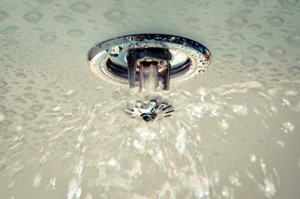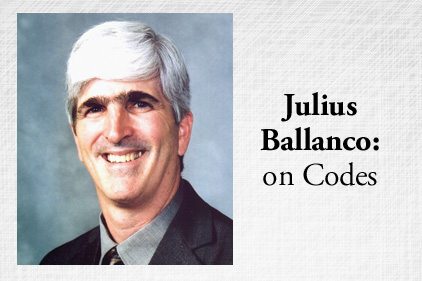
|
|
As expected, a number of changes have been submitted to remove sprinkler requirements from the International Residential Code. Photo credit: ©istockphoto.com/Jimmi Larsen. |
The International Code Council has started the Group B code cycle. There are now three cycles identified as A, B and C.
Group A, which includes all changes to the Plumbing, Mechanical, Fuel Gas and Building codes, was completed last year. Group B addresses changes to the Residential, Energy Conservation, Fire and Energy Conservation codes, to name a few. Group B also includes changes to the administrative sections of all codes, including Plumbing, Mechanical and Fuel Gas.
With the start of Group B, ICC introduces the new way of voting on code changes. Voting members, a group that includes inspectors and code officials, will be able to vote remotely via the Internet. Following the annual meeting, they will have two weeks to vote on the code changes. In the past only voting members who attended the hearings were permitted to vote on code changes.
It is interesting that ICC chose Group B to start the new voting method. With the International Residential Code in the group, one of the more controversial subject matters has been the requirement for installing a fire sprinkler system in all new one- and two-family dwellings and townhouses.
The National Association of Home Builders has made it very clear to the world it opposes this requirement. Since it was first approved in 2008, NAHB has tried through local legislation to prevent the adoption of the IRC with sprinkler requirements.
As expected, a number of changes have been submitted to remove the sprinkler requirements from the IRC. One of the most disappointing to read is a proposed change from a building official. Shame on you! It is hard to imagine a building official opposed to protecting citizens from death by fire in their homes. Isn’t a building official’s job to protect the public’s health, safety and welfare?
The biggest argument against sprinklers in a home is they are expensive. While a sprinkler system adds cost, the last term I would use is expensive. But that is the smoke and mirrors being used by those opposed to residential sprinkler systems.
I recently put a fully sprinklered addition on my house. With the opening of the walls, it also allowed me to sprinkler another 1,500 sq. ft. of my existing home. I nearly sprinklered my entire home.
The builder originally bid the addition using the 2009 Energy Code requirements. I indicated a desire to have the addition compliant to the 2012 Energy Code. As a result, there was a new bid. Not surprisingly, the upgrade to the new Energy Code requirements cost twice as much as my residential sprinkler installation. How can you consider that expensive?
The home builders supported the changes to the energy code. They assumed there would be a good payback period. However, that is not the case. Based on my costs, the payback for the new energy code is about 100 years. That is not why I did it. I did it because it saves energy. I sprinklered because it saves lives.
It is anticipated there will once again be a lot of discussion on residential sprinklers that will follow through to the annual meeting in September in Atlantic City, N.J.
Positive proposals
The ICC Plumbing, Mechanical and Fuel Gas Code Action Committee continued with its review of the IRC. As a result, a number of good changes are proposed to the plumbing and mechanical sections. Nothing would be considered earth-shattering. Many of the changes will coordinate the IRC with the International Plumbing and Mechanical codes.
One of the coordinated changes would be to add the reclaimed water requirements to the IRC. This would allow the use of reclaimed water in residential structures. It also would allow some of the whole-house systems to be used. One of the smaller systems utilizes the water from the lavatory to flush the water closet. These systems would be acceptable if the reclaimed water section is approved.
Currently, the IRC prohibits food waste disposers to discharge to a combination waste and vent system. A proposed change would remove this prohibition. It is interesting that in many homes disposers are installed on island sinks with a combination waste and vent system. However, the disposer is installed as an add-on item after the inspections have been completed. There doesn’t seem to be a problem with these installations.
One of the surprising changes to the IRC is the addition of a minimum drain size for a shower. The code currently has no requirement. The proposed change would add a requirement for a 1 1/2-in. drain.
Conserving energy
The hearings on the International Energy Conservation Code have sparked some of the longest testimony in recent years. Many of the changes relate to the building envelope. This year, a few changes have been submitted to the plumbing and mechanical sections.
After speaking to my brother, a contractor by trade, I submitted a number of changes on boiler setback controls. My brother complained the Energy Code is missing one of the biggest energy- saving devices for hydronic heating systems. He is right. No one can argue that an outdoor setback control doesn’t save a lot of energy.
There also are some changes related to hot water re-circulation and pipe insulation. Once again there will be plenty of discussion on those fronts.
You can download the ICC code changes at www.iccsafe.org. The first set of hearings is scheduled for April 21-30 in Dallas. You can follow the hearings on the Internet by connecting to the ICC website.
Remembering Rand
On a sad note, my good friend Rand Ackroyd died suddenly on Feb. 16. Rand has been active in the codes and standards profession for as long as I can remember. I first met Rand when he was vice president of research and development for Watts.
Rand was one of the most knowledgeable individuals I ever met when it came to backflow protection. He was a master. Plus, he had a number of patents on backflow preventers and other devices. He was a genius in all other phases of plumbing design.
In recent years, Rand served as executive director of the Plumbing and Drainage Institute. He is a past international president of the American Society of Sanitary Engineering. His brilliance, wit and calming demeanor will be greatly missed in the codes and standards profession. Please keep Rand in your prayers.


